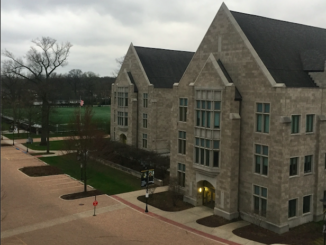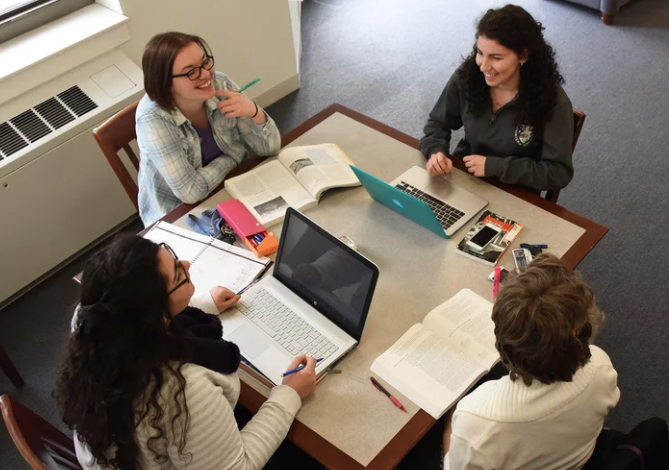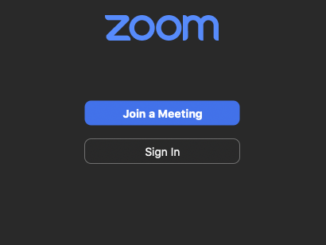
Roberto Alonso
Lead Editor
January 9, 2019
Dominican hires strategic partner in effort to increase graduate enrollment and revenue as part of a multi-year contract.
In July of 2018, Dominican partnered up with Collegis Education, a company dedicated to offering a corporate arm to universities to increase enrollment and revenue simultaneously.
According to Vice President for Finances Mark Titzer, Collegis acts as a third party that helps universities identify new market opportunities and convert those opportunities to enrollments.
“They’re helping us to launch an online master’s in Social Work program, fully online,” Titzer said. “That would be a regional reach that would potentially enroll students from around the Midwest who are either unwilling or not able to come to Dominican’s [campus] to get a masters in Social Work.”
According to Titzer, apart from creating an online Social Work master’s, Collegis has also taken charge of advertising and working the “enrollment funnel” at Dominican.
According to Collegis, the enrollment funnel is the process that potential university applicants take when seeking a school. Becoming aware of the university and what they have to offer, to consider the possibility of attending that university, to actually enrolling.
“The market for graduate [school] enrollment has been less about financial aid optimization as it has been about funnel optimization,” Titzer said.
According to Titzer, the decreasing head count in graduate programs isn’t a new or uncommon phenomenon, and neither is Dominican seeking help from a third-party.
“While this sounds like perhaps something brand new, or like a departure from the good-ole Dominican days, we’ve been working with professional service partners on different initiatives, as other universities have, for many, many years,” he said. “It’s just that they might go unsung or unknown.”
“What we’re trying to do is help undergraduate students convert to a graduate student.”
– Balcazar
In the “10-Year Enrollment Trends by School, FA08_FA18” document distributed by the Office of Institutional Effectiveness, it shows a 48.1 percent drop in graduate students from 2008 to 2018, going from 1,704 to 884 total graduate students.
According to Vice President for Enrollment Management and Marketing Genaro Balcazar, part of the problem with graduate school enrollments is that many undergraduates who express interest in graduate studies do not actually sign up.
“What we’re trying to do is help undergraduate students convert to a graduate student. 75 or 77 percent of incoming freshman, when asked as freshman, have indicated the desire to get a masters degree at some point but only 15 percent of our current graduate enrollment [were] our own students,” he said. “So some of those freshman who said their end goal is to get a professional degree, they’re out there somewhere or they’re not going to school and so there’s an opportunity for us to to attract them.”
Titzer agreed that conversion makes sense.
“Why go look for new customers if your customers are potentially right under your roof ?” he said.
According to Titzer, the expectations of possible graduate students have changed notably, “You can maybe argue Dominican is late to catch up. I don’t think anybody would dispute that, and so there are ways we need to catch up to that and succeed and they’re going to take some investing and some different ways of doing business.”
According to Titzer, hiring Collegis was a strategic move to allocate advertising and digital marketing dollars from the different colleges and centralizing them towards professionals with the ability to take on this task.
“We took some advertising and digital marketing money that were in different pockets around the university and we centralized them to Enrollment Management and Marketing and said we’re going to go about deploying these in a more centralized fashion. So hopefully if you’re in library science or school of business or in education or in health sciences, the intention is that you’re going to get a bigger bank for your buck,” Titzer said.
Dominican’s limited resources and staff currently doens’t allow for this task to be taken on single-handedly, instead, it requires outside help.
“We run a very light and thin staff — very, very light,” he said. “We have right now, currently, three graduate enrollment professionals.” Balcazar said, “We have 23 graduate programs. Those three individuals have to manage all the work associated with admission, recruitment, and enrollment of graduate students for all 23 of those programs.”
According to Balcazar, Dominican does not have the resources needed to increase graduate school enrollment, the alternative would have been to hire a larger staff.
“To update all our information systems, to streamline all of our processes and operations, to optimize all of our marketing efforts, all simultaneously. Do we have the bandwidth to do that, internally, right now?” he asked. “No, we don’t.”



